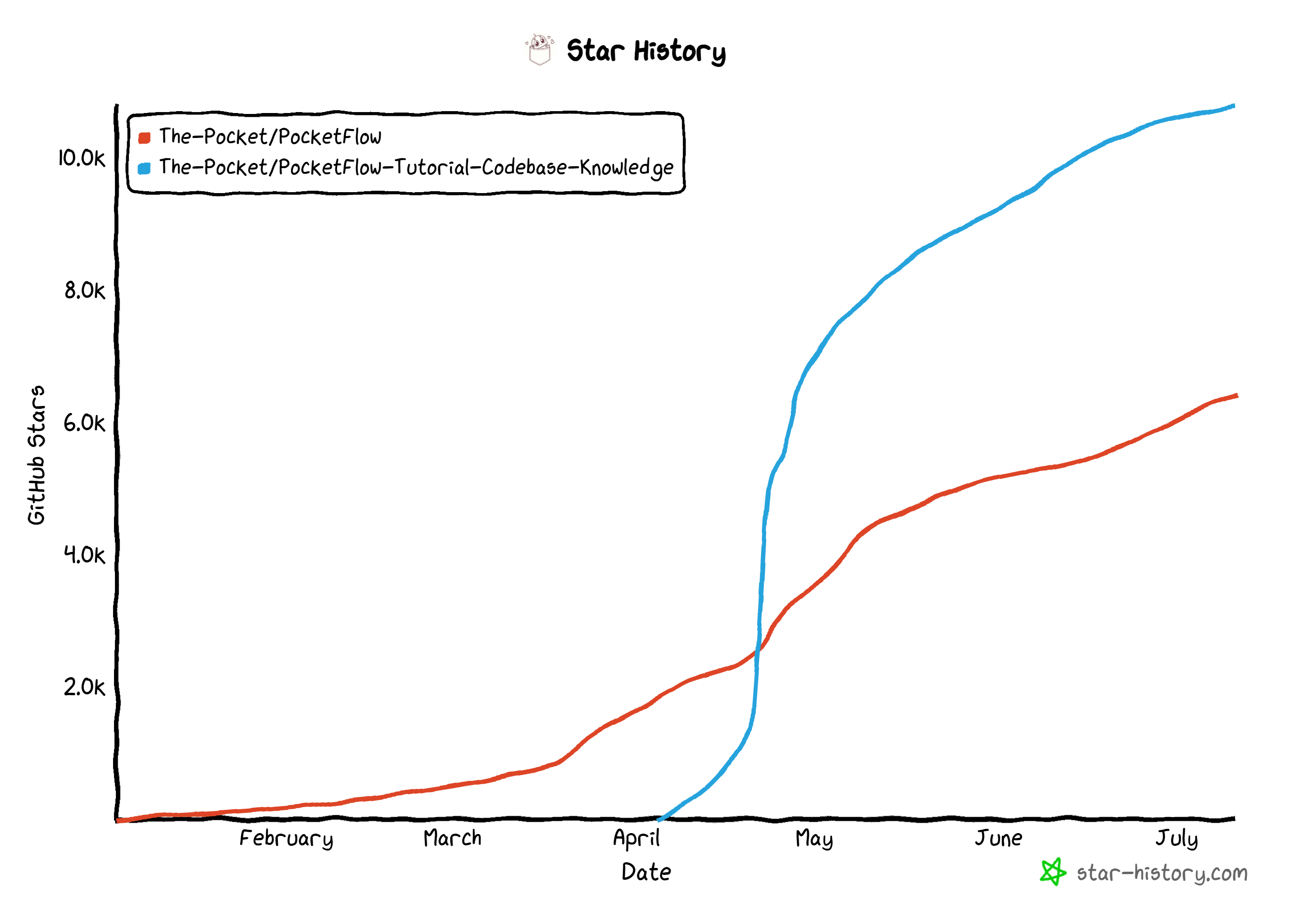You have been lied to.
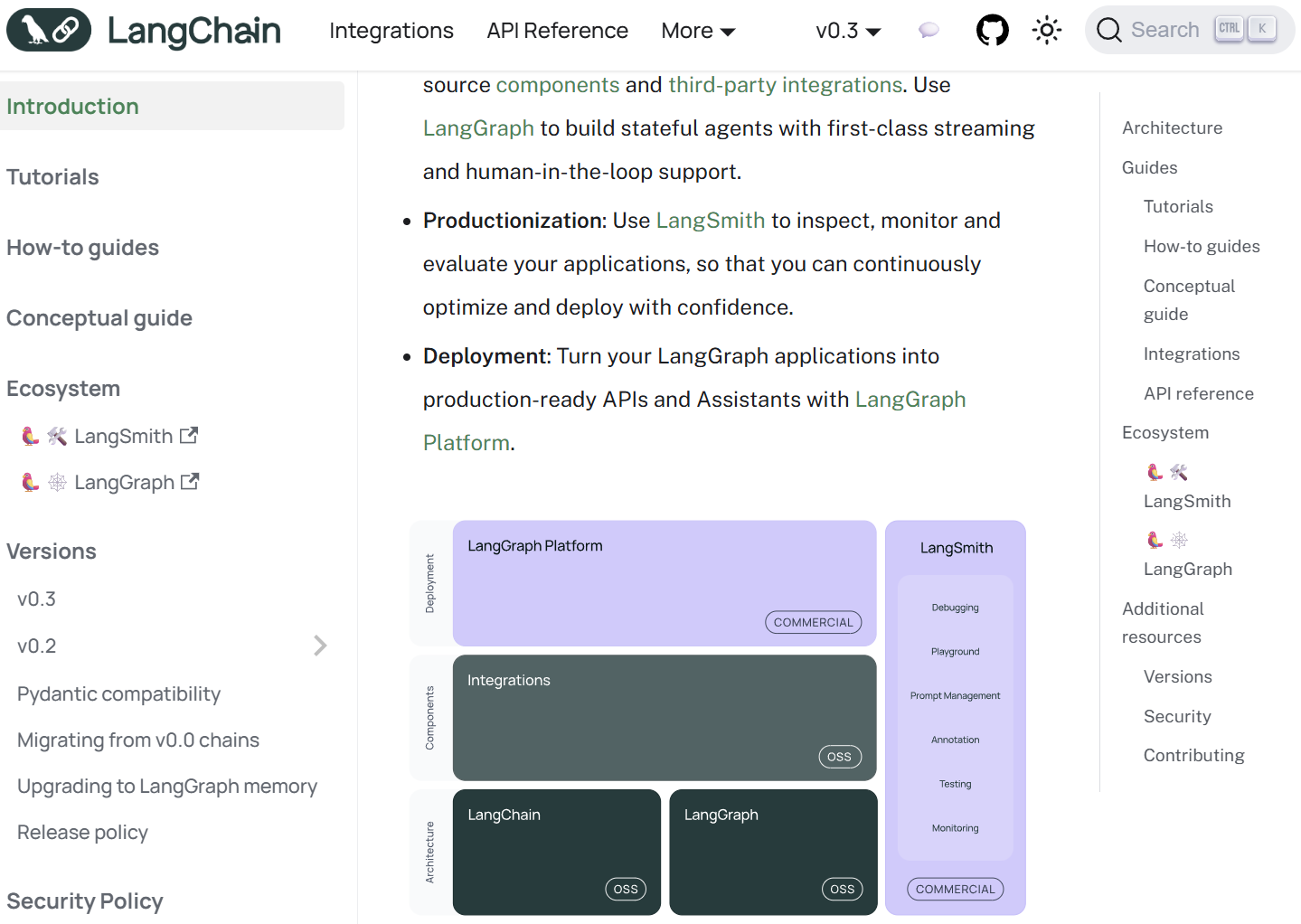
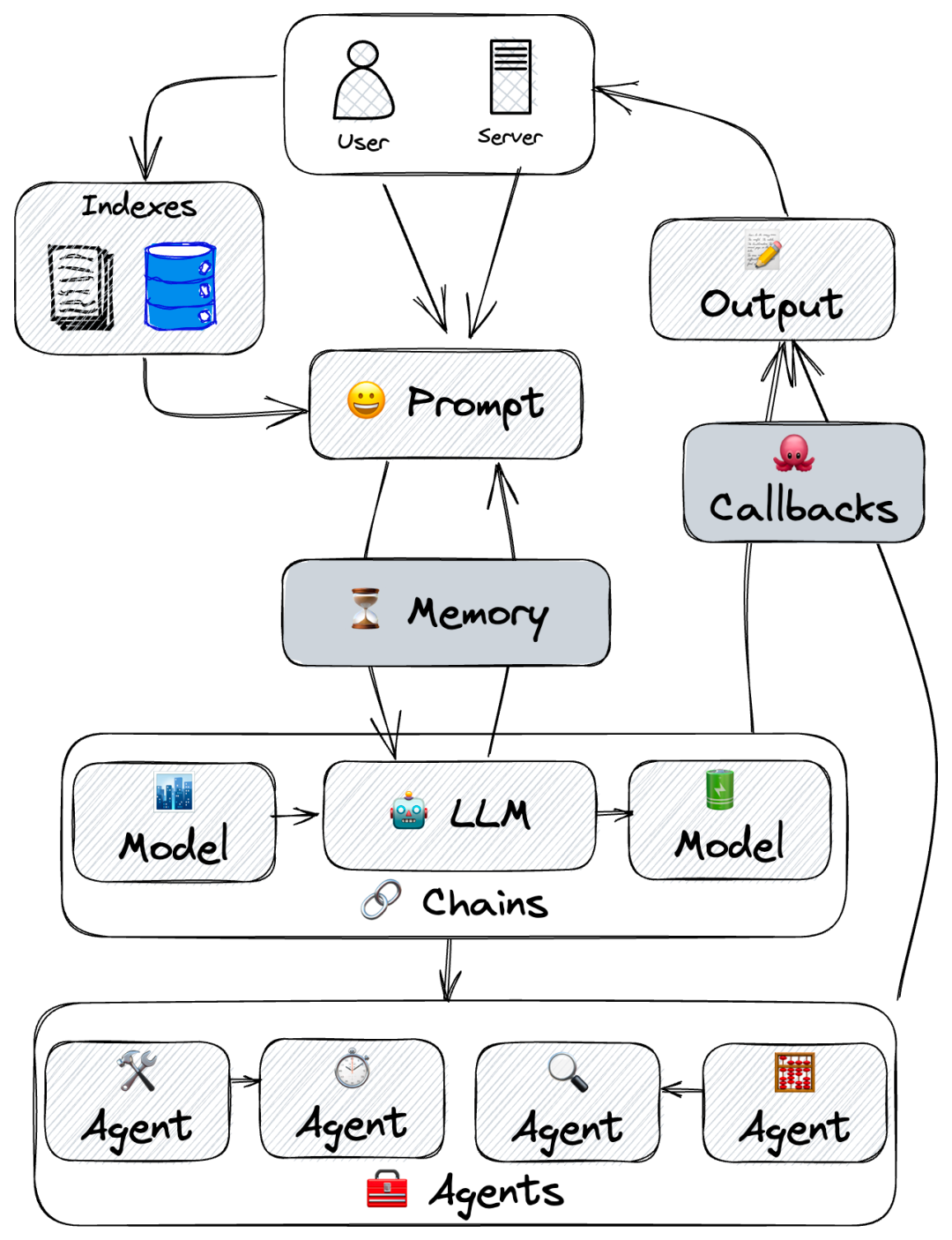
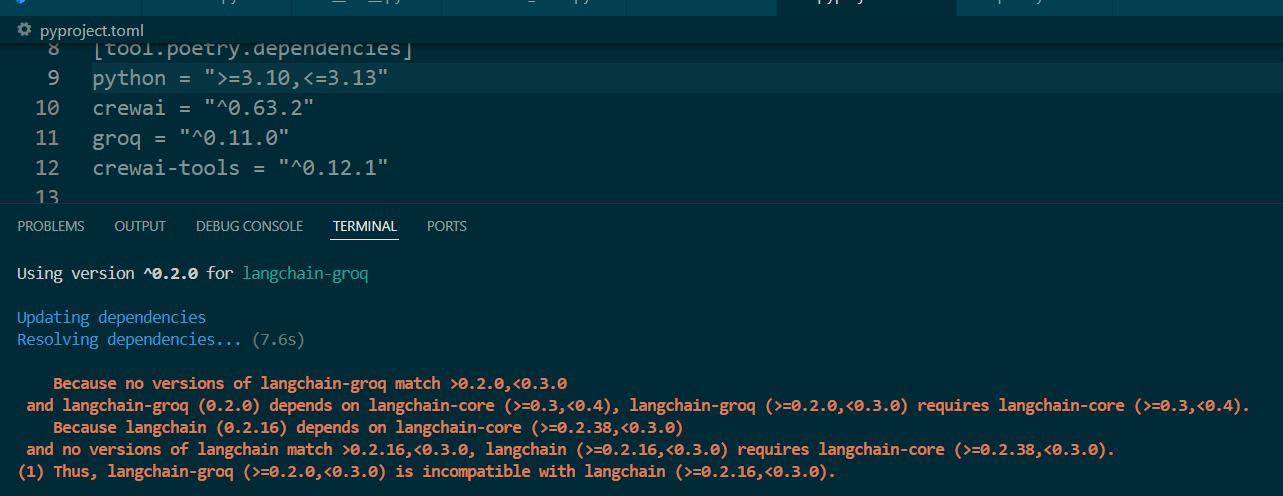
Does it really need to be this complicated?
What if we stripped everything away?
Your LLM Framework Only Needs
100 LINES
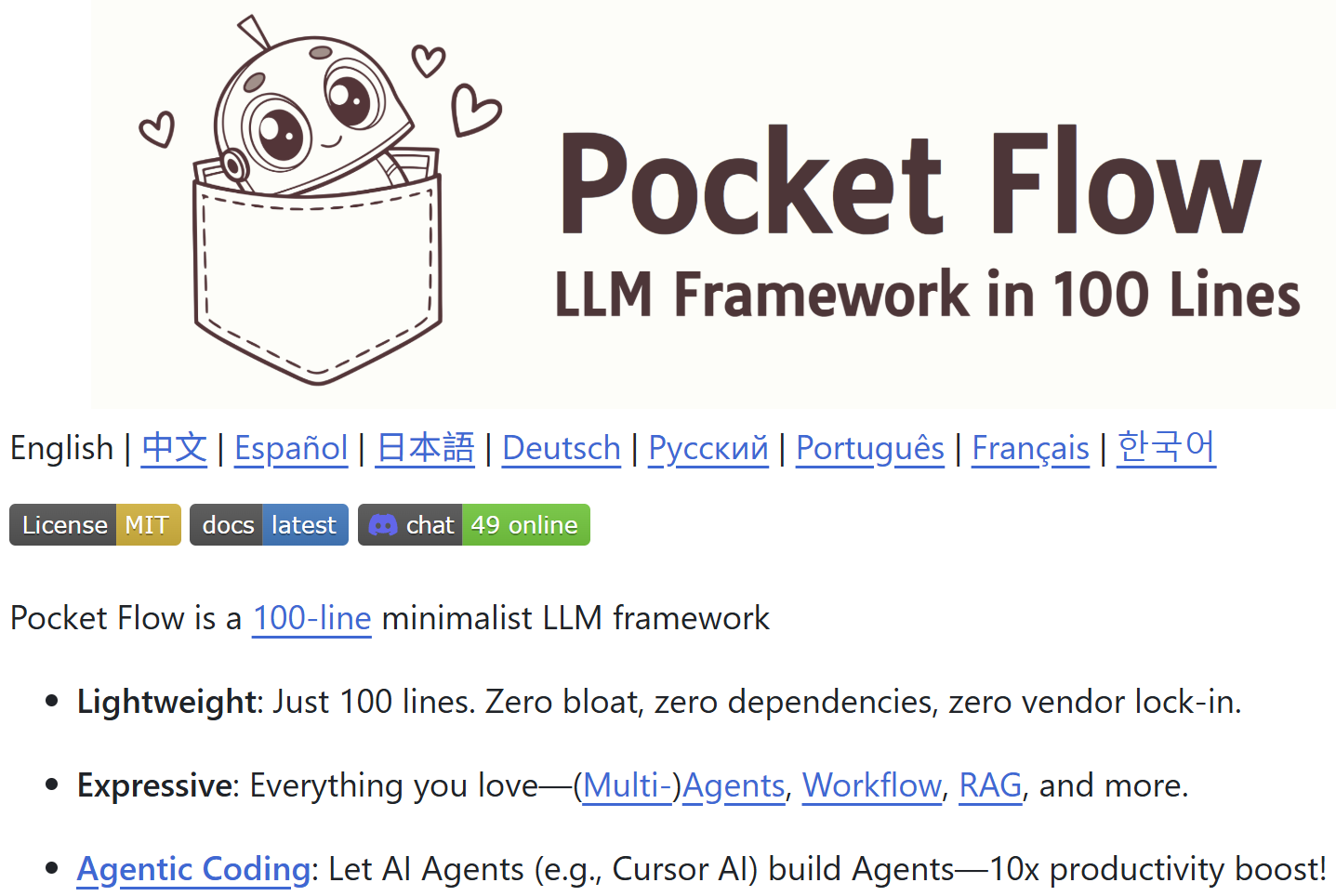
https://github.com/The-Pocket/PocketFlow
import asyncio, warnings, copy, time
class BaseNode:
def __init__(self): self.params,self.successors={},{}
def set_params(self,params): self.params=params
def next(self,node,action="default"):
if action in self.successors: warnings.warn(f"Overwriting successor for action '{action}'")
self.successors[action]=node; return node
def prep(self,shared): pass
def exec(self,prep_res): pass
def post(self,shared,prep_res,exec_res): pass
def _exec(self,prep_res): return self.exec(prep_res)
def _run(self,shared): p=self.prep(shared); e=self._exec(p); return self.post(shared,p,e)
def run(self,shared):
if self.successors: warnings.warn("Node won't run successors. Use Flow.")
return self._run(shared)
def __rshift__(self,other): return self.next(other)
def __sub__(self,action):
if isinstance(action,str): return _ConditionalTransition(self,action)
raise TypeError("Action must be a string")
class _ConditionalTransition:
def __init__(self,src,action): self.src,self.action=src,action
def __rshift__(self,tgt): return self.src.next(tgt,self.action)
class Node(BaseNode):
def __init__(self,max_retries=1,wait=0): super().__init__(); self.max_retries,self.wait=max_retries,wait
def exec_fallback(self,prep_res,exc): raise exc
def _exec(self,prep_res):
for self.cur_retry in range(self.max_retries):
try: return self.exec(prep_res)
except Exception as e:
if self.cur_retry==self.max_retries-1: return self.exec_fallback(prep_res,e)
if self.wait>0: time.sleep(self.wait)
class BatchNode(Node):
def _exec(self,items): return [super(BatchNode,self)._exec(i) for i in (items or [])]
class Flow(BaseNode):
def __init__(self,start=None): super().__init__(); self.start_node=start
def start(self,start): self.start_node=start; return start
def get_next_node(self,curr,action):
nxt=curr.successors.get(action or "default")
if not nxt and curr.successors: warnings.warn(f"Flow ends: '{action}' not found in {list(curr.successors)}")
return nxt
def _orch(self,shared,params=None):
curr,p,last_action =copy.copy(self.start_node),(params or {**self.params}),None
while curr: curr.set_params(p); last_action=curr._run(shared); curr=copy.copy(self.get_next_node(curr,last_action))
return last_action
def _run(self,shared): p=self.prep(shared); o=self._orch(shared); return self.post(shared,p,o)
def post(self,shared,prep_res,exec_res): return exec_res
class BatchFlow(Flow):
def _run(self,shared):
pr=self.prep(shared) or []
for bp in pr: self._orch(shared,{**self.params,**bp})
return self.post(shared,pr,None)
class AsyncNode(Node):
async def prep_async(self,shared): pass
async def exec_async(self,prep_res): pass
async def exec_fallback_async(self,prep_res,exc): raise exc
async def post_async(self,shared,prep_res,exec_res): pass
async def _exec(self,prep_res):
for i in range(self.max_retries):
try: return await self.exec_async(prep_res)
except Exception as e:
if i==self.max_retries-1: return await self.exec_fallback_async(prep_res,e)
if self.wait>0: await asyncio.sleep(self.wait)
async def run_async(self,shared):
if self.successors: warnings.warn("Node won't run successors. Use AsyncFlow.")
return await self._run_async(shared)
async def _run_async(self,shared): p=await self.prep_async(shared); e=await self._exec(p); return await self.post_async(shared,p,e)
def _run(self,shared): raise RuntimeError("Use run_async.")
class AsyncBatchNode(AsyncNode,BatchNode):
async def _exec(self,items): return [await super(AsyncBatchNode,self)._exec(i) for i in items]
class AsyncParallelBatchNode(AsyncNode,BatchNode):
async def _exec(self,items): return await asyncio.gather(*(super(AsyncParallelBatchNode,self)._exec(i) for i in items))
class AsyncFlow(Flow,AsyncNode):
async def _orch_async(self,shared,params=None):
curr,p,last_action =copy.copy(self.start_node),(params or {**self.params}),None
while curr: curr.set_params(p); last_action=await curr._run_async(shared) if isinstance(curr,AsyncNode) else curr._run(shared); curr=copy.copy(self.get_next_node(curr,last_action))
return last_action
async def _run_async(self,shared): p=await self.prep_async(shared); o=await self._orch_async(shared); return await self.post_async(shared,p,o)
async def post_async(self,shared,prep_res,exec_res): return exec_res
class AsyncBatchFlow(AsyncFlow,BatchFlow):
async def _run_async(self,shared):
pr=await self.prep_async(shared) or []
for bp in pr: await self._orch_async(shared,{**self.params,**bp})
return await self.post_async(shared,pr,None)
class AsyncParallelBatchFlow(AsyncFlow,BatchFlow):
async def _run_async(self,shared):
pr=await self.prep_async(shared) or []
await asyncio.gather(*(self._orch_async(shared,{**self.params,**bp}) for bp in pr))
return await self.post_async(shared,pr,None)
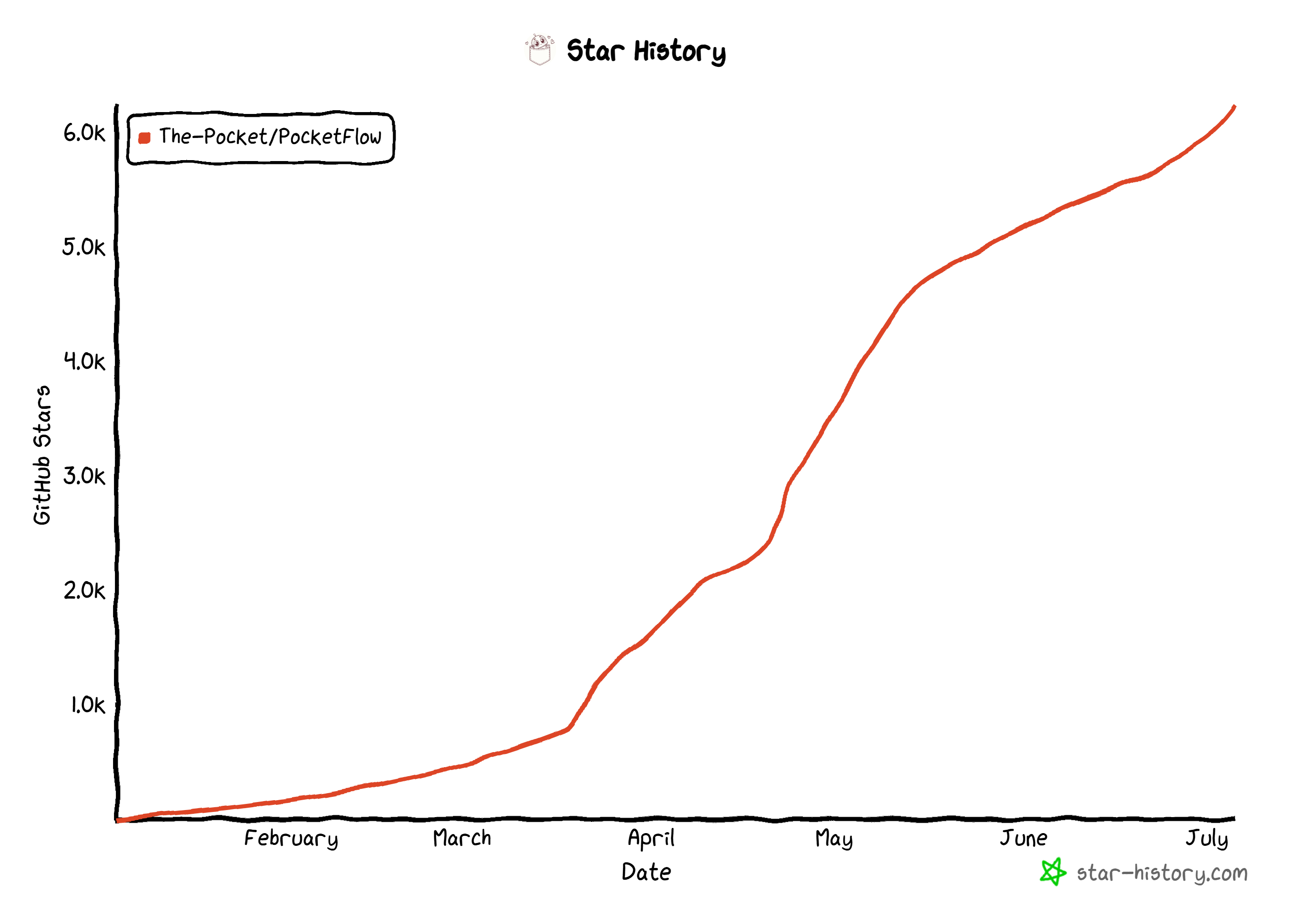
| Abstraction | App Wrappers | Vendor Wrappers | Lines | Size | |
|---|---|---|---|---|---|
| LangChain | Agent, Chain | Many (e.g., QA, Summarization) |
Many (e.g., OpenAI, Pinecone, etc.) |
405K | +166MB |
| CrewAI | Agent, Chain | Many (e.g., FileReadTool, SerperDevTool) |
Many (e.g., OpenAI, Anthropic, Pinecone, etc.) |
18K | +173MB |
| SmolAgent | Agent | Some (e.g., CodeAgent, VisitWebTool) |
Some (e.g., DuckDuckGo, Hugging Face, etc.) |
8K | +198MB |
| LangGraph | Agent, Graph | Some (e.g., Semantic Search) |
Some (e.g., PostgresStore, SqliteSaver, etc.) |
37K | +51MB |
| AutoGen | Agent | Some (e.g., Tool Agent, Chat Agent) |
Many [Optional] (e.g., OpenAI, Pinecone, etc.) |
7K (core-only) |
+26MB (core-only) |
| PocketFlow | Graph | None | None | 100 | +56KB |



TEAR DOWN THE BLACK BOXES
NOT ANOTHER TUTORIAL
A MASTERCLASS IN FIRST PRINCIPLES
You will learn how agents ACTUALLY work.
You will learn how RAG is REALLY built.
You will learn from THE GROUND UP.
If you know a little bit of Python.
You're ready.
THESE 100 LINES.
How does it work?
3 Core Ideas:
The Node • The Shared Store • The Flow
1. The Node: The Worker
3 Steps:
preprocessing
• execution
• postprocessing
Step 1: prep
class BaseNode:
def prep(self, shared): pass
def exec(self, prep_res): pass
def post(self, shared, prep_res, exec_res): pass
def _run(self,shared):
p=self.prep(shared); e=self._exec(p);
return self.post(shared,p,e)
prep: Reads from shared store to get ready.
Step 2: exec
class BaseNode:
def prep(self, shared): pass
def exec(self, prep_res): pass
def post(self, shared, prep_res, exec_res): pass
def _run(self,shared):
p=self.prep(shared); e=self._exec(p);
return self.post(shared,p,e)
exec: Performs the core task in isolation.
Step 3: post
class BaseNode:
def prep(self, shared): pass
def exec(self, prep_res): pass
def post(self, shared, prep_res, exec_res): pass
def _run(self,shared):
p=self.prep(shared); e=self._exec(p);
return self.post(shared,p,e)
post: Writes results back and returns an 'action' string for the next Node.

Node: Built-in Fault Tolerance
class Node(BaseNode):
def __init__(self, max_retries=1, wait=0):
super().__init__()
self.max_retries, self.wait = max_retries, wait
def _exec(self, prep_res):
for self.cur_retry in range(self.max_retries):
try: return self.exec(prep_res)
except Exception as e:
if self.cur_retry == self.max_retries - 1:
return self.exec_fallback(prep_res, e)
if self.wait > 0: time.sleep(self.wait)
def exec_fallback(self, prep_res, exc): raise exc
# A node that calls an LLM to summarize a file
class SummarizeFile(Node):
def prep(self, shared):
return shared.get("file_content")
def exec(self, file_content):
# This would make a real API call to an LLM
return call_llm(f"Summarize this: {file_content}")
def exec_fallback(self, file_content, error):
# If the LLM call fails after all retries...
print(f"LLM call failed with error: {error}")
return "Sorry, summarizing the file failed."
def post(self, shared, prep_res, exec_res):
shared["summary"] = exec_res
return "next"
# Instantiate the node with retry logic
summarizer = SummarizeFile(
max_retries=3,
wait=5
)
Node = A single, reliable worker.
3 Core Ideas:
The Node • The Shared Store • The Flow
# The Shared Store is just a dictionary.
shared = {}
# Node A writes to it.
shared["result_from_A"] = 42
# Node B reads from it.
data_for_b = shared["result_from_A"]

Shared Store in Action
class LoadData(Node):
# This node's only job is to add data to the shared store.
def post(self, shared, prep_res, exec_res):
shared["data"] = "Some important text content"
Shared Store in Action
class Summarize(Node):
def prep(self, shared):
# Reads the data that the previous node wrote.
return shared["data"]
def exec(self, prep_res):
# Does its work on the prepared data.
return call_llm(f"Summarize: {prep_res}")
def post(self, shared, prep_res, exec_res):
# Writes its own result back to the shared store.
shared["summary"] = exec_res
3 Core Ideas:
The Node • The Shared Store • The Flow
Defining the Flow
# A simple, default transition
node_a >> node_b
Defining the Flow
# Named transitions for branching logic
review_node - "approved" >> payment_node
review_node - "rejected" >> finish_node
How It Works: The Address Book
class BaseNode:
def __init__(self):
self.params, self.successors = {}, {}
def next(self, node, action="default"):
# Adds an entry to the node's "address book"
self.successors[action] = node
return node
How It Works: The Orchestrator
class Flow(BaseNode):
def _orch(self, shared, params=None):
# Runs a node, gets the action, finds the next node, repeats
while curr:
last_action = curr._run(shared)
curr = self.get_next_node(curr, last_action)
def get_next_node(self, curr, action):
# Looks up the action in the current node's successors
return curr.successors.get(action or "default")
A Flow is a Node
This allows for powerful, nested workflows.
Where is the LLM?
No OpenAI. No Anthropic. No Google.
No Vendor Lock-in.

Maintenance Nightmare
from openai import OpenAI
import os
def call_llm(messages):
client = OpenAI(api_key=os.environ.get("OPENAI_API_KEY"))
response = client.chat.completions.create(
model="gpt-4o",
messages=messages
)
return response.choices[0].message.content
Write the function yourself!
Let's Build a Chatbot.
A chatbot is just a self-loop.
class ChatNode(Node):
def prep(self, shared):
# Initialize messages if this is the first run
if "messages" not in shared:
shared["messages"] = []
print("Welcome to the chat!")
# Get user input
user_input = input("\nYou: ")
# Add user message to history
shared["messages"].append({"role": "user", "content": user_input})
# Return all messages for the LLM
return shared["messages"]
def exec(self, messages):
# Call LLM with the entire conversation history
response = call_llm(messages)
return response
def post(self, shared, prep_res, exec_res):
# Print the assistant's response
print(f"\nAssistant: {exec_res}")
# Add assistant message to history
shared["messages"].append({"role": "assistant", "content": exec_res})
# Loop back to continue the conversation
return "continue"
# Create the flow with self-loop
chat_node = ChatNode()
chat_node - "continue" >> chat_node
flow = Flow(start=chat_node)
# Start the chat
if __name__ == "__main__":
shared = {}
flow.run(shared)
Conversation Walkthrough
# 1. Initial State
shared = {}
Conversation Walkthrough
# 2. After prep()
shared = {
"messages": [
{"role": "user", "content": "Hello, who are you?"}
]
}
Conversation Walkthrough
# 3. During exec()
# No change to shared store
shared = {
"messages": [
{"role": "user", "content": "Hello, who are you?"}
]
}
Conversation Walkthrough
# 4. After post()
shared = {
"messages": [
{"role": "user", "content": "Hello, who are you?"},
{"role": "assistant", "content": "I am a helpful AI assistant."}
]
}
Chatbot = 1 Node + 1 Loop + 1 Dictionary.
The Next Challenge
Structured Output
What you WANT
name: Jane Doe
email: jane@example.com
What you GET
"Certainly! The name mentioned in the
document is Jane Doe, and you can find
her email at jane@example.com."
Brittle
Unreliable
Frustrating
Solution: Just Ask
Pro Tip: Speak YAML, Not JSON
JSON - Fragile
{
"dialogue": "Alice said: \"Hello Bob.\\nHow are you?\""
}
escaping
YAML - Robust
dialogue: |
Alice said: "Hello Bob.
How are you?"
no escaping
Building the Resume Parser
class ResumeParserNode(Node):
def prep(self, shared):
# The resume text is expected to be in the shared store
return shared["resume_text"]
def exec(self, resume_text):
prompt = f"""Analyze the resume below. Output ONLY the requested
information in YAML format.
**Resume:**
```
{resume_text}
```
**YAML Output Requirements:**
- Extract `name` (string).
- Extract `email` (string).
- Extract `experience` (list of objects).
**Example Format:**
```yaml
name: Jane Doe
email: jane@example.com
experience:
- title: Manager
company: Corp A
```
Generate the YAML output now:
"""
response = call_llm(prompt)
# A simple way to extract the YAML block from the response
yaml_str = response.split("```yaml")[1].split("```")[0].strip()
structured_result = yaml.safe_load(yaml_str)
# Assertions to enforce the output structure
assert "name" in structured_result, "Name is required"
assert "email" in structured_result, "Email is required"
return structured_result
def post(self, shared, prep_res, exec_res):
shared["structured_data"] = exec_res
Before
!! JOHN SMTIH !!
contact: 123-456-7890.
email me at johnsmtih1983@gnail.com
Work Experience:
- at ABC Corportaion i was the SALES MANAGER
- XYZ Industries, position: ASST. MANAGER
After
# The clean, structured data
{
"name": "JOHN SMTIH",
"email": "johnsmtih1983@gnail.com",
"experience": [
{"title": "SALES MANAGER", "company": "ABC Corportaion"},
{"title": "ASST. MANAGER", "company": "XYZ Industries"}
]
}
The Next Challenge: Processing in Bulk
📄
1 Resume
🗃️
1000 Resumes?
Solution: The BatchNode
Standard Node
class Node:
# Returns one item to process
def prep(self, shared):
return one_item
# Processes one item
def exec(self, one_item):
return one_result
# Receives one result
def post(self, shared, prep_res, exec_res):
pass
BatchNode
class BatchNode(Node):
# Returns a LIST of items
def prep(self, shared):
return [item1, item2, item3]
# Processes ONE item at a time
def exec(self, one_item_from_list):
return one_result
# Receives a LIST of all results
def post(self, shared, prep_res, exec_res_list):
pass
Solution: The BatchNode
Standard Node
class Node:
# Returns one item to process
def prep(self, shared):
return one_item
# Processes one item
def exec(self, one_item):
return one_result
# Receives one result
def post(self, shared, prep_res, exec_res):
pass
BatchNode
class BatchNode(Node):
# Returns a LIST of items
def prep(self, shared):
return [item1, item2, item3]
# Processes ONE item at a time
def exec(self, one_item_from_list):
return one_result
# Receives a LIST of all results
def post(self, shared, prep_res, exec_res_list):
pass
Solution: The BatchNode
Standard Node
class Node:
# Returns one item to process
def prep(self, shared):
return one_item
# Processes one item
def exec(self, one_item):
return one_result
# Receives one result
def post(self, shared, prep_res, exec_res):
pass
BatchNode
class BatchNode(Node):
# Returns a LIST of items
def prep(self, shared):
return [item1, item2, item3]
# Processes ONE item at a time
def exec(self, one_item_from_list):
return one_result
# Receives a LIST of all results
def post(self, shared, prep_res, exec_res_list):
pass
Solution: The BatchNode
Standard Node
class Node:
# Returns one item to process
def prep(self, shared):
return one_item
# Processes one item
def exec(self, one_item):
return one_result
# Receives one result
def post(self, shared, prep_res, exec_res):
pass
BatchNode
class BatchNode(Node):
# Returns a LIST of items
def prep(self, shared):
return [item1, item2, item3]
# Processes ONE item at a time
def exec(self, one_item_from_list):
return one_result
# Receives a LIST of all results
def post(self, shared, prep_res, exec_res_list):
pass
The Implementation: Dumb Simple
class BatchNode(Node):
# This is the entire implementation.
def _exec(self, items):
# It's just a simple for loop.
return [super(BatchNode, self)._exec(i) for i in (items or [])]
class BatchResumeParserNode(BatchNode):
def prep(self, shared):
# Assumes a list of resumes is already in the shared store.
return shared.get("resumes", [])
def exec(self, resume_text):
prompt = f"""Analyze the resume below. Output ONLY the requested
information in YAML format.
**Resume:**
```
{resume_text}
```
**YAML Output Requirements:**
- Extract `name` (string).
- Extract `email` (string).
- Extract `experience` (list of objects).
**Example Format:**
```yaml
name: Jane Doe
email: jane@example.com
experience:
- title: Manager
company: Corp A
```
Generate the YAML output now:
"""
response = call_llm(prompt)
# A simple way to extract the YAML block from the response
yaml_str = response.split("```yaml")[1].split("```")[0].strip()
structured_result = yaml.safe_load(yaml_str)
# Assertions to enforce the output structure
assert "name" in structured_result, "Name is required"
assert "email" in structured_result, "Email is required"
return structured_result
def post(self, shared, prep_res, all_results_list):
# This runs only ONCE, after all items are processed.
# It receives a list of all individual results.
shared["all_parsed_resumes"] = all_results_list
Batch Node Walkthrough
returns [resume1, resume2, resume3]"] --> exec_loop subgraph exec_loop ["_exec() loop"] C["exec(resume1)"] --> E["exec(resume2)"] --> G["exec(resume3)"] end exec_loop --> H["post():
receives [result1, result2, result3]"]
But... how is this any faster?
It isn't.
Total Time = Sum of All Tasks
Unleashing Parallel Speed with Async
The True Villain: WAITING
5-20 seconds of pure, wasted time... per resume.
The Smart Chef Analogy
The Slow Chef
The Smart Chef
2 Magic Words in Python
async
A label for functions that might wait
await
Pause one task and let others run
import asyncio
import time
async def make_coffee(): # Takes 3s
print("Start coffee...")
await asyncio.sleep(3)
print("Coffee ready!")
async def make_toast(): # Takes 2s
print("Start toast...")
await asyncio.sleep(2)
print("Toast ready!")
async def main():
start_time = time.time()
# Run both tasks concurrently
await asyncio.gather(
make_coffee(),
make_toast()
)
print(f"Total time: {time.time() - start_time:.2f}s")
asyncio.run(main())
The Output
Start coffee...
Start toast...
Toast ready!
Coffee ready!
Total time: 3.01sTotal Time = Time of Longest Task
Upgrading to an Async LLM Call
Before - Synchronous
from openai import OpenAI
import os
def call_llm(messages):
client = OpenAI(api_key=...)
response = client.chat.completions.create(
model="gpt-4o",
messages=messages
)
return response.choices[0].message.content
After - Asynchronous
from openai import AsyncOpenAI
import os
async def call_llm_async(messages):
client = AsyncOpenAI(api_key=...)
response = await client.chat.completions.create(
model="gpt-4o",
messages=messages
)
return response.choices[0].message.content
Upgrading the Batch Node
Before - BatchNode
# Before
class BatchResumeParserNode(BatchNode):
def prep(self, shared):
return shared.get("resumes", [])
def exec(self, one_resume_text):
...
response = call_llm(prompt)
...
def post(self, shared, prep_res, exec_res_list):
shared["all_parsed_resumes"] = exec_res_list
After - AsyncParallelBatchNode
# After
class BatchResumeParserNode(AsyncParallelBatchNode):
async def prep_async(self, shared):
return shared.get("resumes", [])
async def exec_async(self, one_resume_text):
...
response = await call_llm_async(prompt)
...
async def post_async(self, shared, prep_res,
exec_res_list):
shared["all_parsed_resumes"] = exec_res_list
The "Unbelievably Simple" Implementation
BatchNode - Sequential
class BatchNode(Node):
def _exec(self, items):
# A simple, sequential for loop
return [super(BatchNode, self)._exec(i) for i in (items or [])]
AsyncParallelBatchNode - Parallel
class AsyncParallelBatchNode(AsyncNode, BatchNode):
async def _exec(self, items):
# Creates tasks and runs them all concurrently
return await asyncio.gather(*(super(AsyncParallelBatchNode, self)._exec(i) for i in items))
A loop becomes a gather. That's it.
The Performance Payoff
Sequential Time
10 resumes × 10 seconds
100s
Parallel Time
Time of Longest Task
10s
⚠️ Heads Up!
1. Watch for API Rate Limits
2. Ensure Tasks are Independent
Multi-Step Workflows
"Write a comprehensive blog post about AI safety..."
Generic rambling output
Task Decomposition
Break big tasks into small tasks
Workflow + Batch = Power
List → Parallel Processing → Combine
class GenerateOutline(Node):
def prep(self, shared):
return shared["topic"]
def exec(self, topic):
prompt = f"List section titles for {topic}"
return call_llm(prompt)
def post(self, shared, prep_res, exec_res):
shared["section_titles"] = exec_res.strip().split('\n')
class BatchDraftSections(BatchNode):
def prep(self, shared):
return shared["section_titles"]
def exec(self, section_title):
prompt = f"Write content for: {section_title}"
return call_llm(prompt)
def post(self, shared, prep_res, exec_res):
shared["section_drafts"] = exec_res
class CombineAndRefine(Node):
def prep(self, shared):
return shared["section_drafts"]
def exec(self, section_drafts):
combined = "\n\n".join(section_drafts)
prompt = f"Combine and polish: {combined}"
return call_llm(prompt)
def post(self, shared, prep_res, exec_res):
shared["final_article"] = exec_res
# Connect the chain
outline_node >> batch_draft_node >> combine_node
# Create and run
flow = Flow(start=outline_node)
shared = {"topic": "AI Safety"}
flow.run(shared)
Workflow Walkthrough
# Initial State
shared = {"topic": "AI Safety"}
# After Outliner - now we have a LIST!
shared = {
"topic": "AI Safety",
"section_titles": ["Introduction", "Key Risks", "Solutions"]
}
# After BatchDrafter - LIST of drafted sections!
shared = {
"topic": "AI Safety",
"section_titles": ["Introduction", "Key Risks", "Solutions"],
"section_drafts": [
"AI safety introduction content...",
"Key risks in AI development...",
"Proposed solutions and approaches..."
]
}
# Final result - combined and polished
shared = {
"topic": "AI Safety",
"section_titles": ["Introduction", "Key Risks", "Solutions"],
"section_drafts": [...],
"final_article": "AI Safety: A Comprehensive Guide..."
}
By breaking one complex request into 3 simple requests...
Much higher-quality output!
The path is fixed. It can't adapt.
What if it could REWRITE its plan?
What if it could ADAPT on the fly?
What if it could actually THINK?
The AGENT
Magic? Consciousness? A Black Box?
An Agent = A Flow with a Loop & a Branch
Building a Web Search Agent
The Brain: DecideAction Node
class DecideAction(Node):
def prep(self, shared):
context = shared.get("context", "No previous search")
question = shared["question"]
return question, context
def exec(self, inputs):
question, context = inputs
prompt = f"""Given the context, should you 'search' for more
info or 'answer' now?
Context: {context}
Query: {question}
Actions:
- search
- answer
Respond in YAML:
```yaml
action: <your_choice>
search_query: <if searching>
```"""
response = call_llm(prompt)
yaml_str = response.split("```yaml")[1].split("```")[0].strip()
decision = yaml.safe_load(yaml_str)
return decision
def post(self, shared, prep_res, exec_res):
if exec_res["action"] == "search":
shared["search_query"] = exec_res["search_query"]
return exec_res["action"]
The Tool: SearchWeb Node
class SearchWeb(Node):
def prep(self, shared):
return shared["search_query"]
def exec(self, search_query):
# Search the web for information
search_client = GoogleSearchAPI(api_key="YOUR_API_KEY")
results = search_client.search({
"query": search_query,
"num_results": 3,
"language": "en"
})
formatted_results = f"Results for: {search_query}\n"
for result in results:
formatted_results += f"- {result.title}: {result.snippet}\n"
return formatted_results
def post(self, shared, prep_res, exec_res):
previous = shared.get("context", "")
shared["context"] = previous + "\n\nSEARCH: " + \
prep_res + "\nRESULTS: " + exec_res
return "decide" # Loop back to the brain
The Exit: DirectAnswer Node
class DirectAnswer(Node):
def prep(self, shared):
question = shared["question"]
context = shared.get("context", "")
return question, context
def exec(self, inputs):
question, context = inputs
prompt = f"""Based on the following information, answer the question.
Question: {question}
Research: {context}
Provide a comprehensive answer using the research results."""
return call_llm(prompt)
def post(self, shared, prep_res, exec_res):
shared["answer"] = exec_res
return "done" # End the flow
Wiring the Graph
# Connect the nodes together
decide_node - "search" >> search_node
decide_node - "answer" >> answer_node
search_node - "decide" >> decide_node # The loop
flow = Flow(start=decide_node)
Tracing a Live Run
Initialization
# Initial State
shared = {
"question": "Who won the 2024 Physics Nobel Prize?"
}
# Start the flow
flow.run(shared)
Round 1: Decide
# After Round 1: Decide
shared = {
"question": "Who won the 2024 Physics Nobel Prize?",
"search_query": "2024 Physics Nobel Prize winner"
}
# LLM Output: 'search'
Round 2: Search
# After Round 2: Search
shared = {
"question": "Who won the 2024 Physics Nobel Prize?",
"search_query": "2024 Physics Nobel Prize winner",
"context": "SEARCH: 2024 Physics Nobel Prize winner\nRESULTS: The 2024 Nobel Prize in Physics was awarded to John Hopfield and Geoffrey Hinton for foundational discoveries and inventions in machine learning..."
}
# Node returns: 'decide'
Round 3: Decide (with context)
# After Round 3: Decide (with context)
shared = {
"question": "Who won the 2024 Physics Nobel Prize?",
"search_query": "2024 Physics Nobel Prize winner",
"context": "SEARCH: 2024 Physics Nobel Prize winner\nRESULTS: The 2024 Nobel Prize in Physics was awarded to John Hopfield and Geoffrey Hinton for foundational discoveries and inventions in machine learning..."
}
# LLM Output: 'answer' (no new data added)
Final Step: Answer
# After Final Step: Answer
shared = {
"question": "Who won the 2024 Physics Nobel Prize?",
"search_query": "2024 Physics Nobel Prize winner",
"context": "SEARCH: 2024 Physics Nobel Prize winner\nRESULTS: The 2024 Nobel Prize in Physics was awarded to John Hopfield and Geoffrey Hinton...",
"answer": "The 2024 Nobel Prize in Physics was awarded to John Hopfield and Geoffrey Hinton for their foundational discoveries and inventions that enable machine learning with artificial neural networks."
}
# Flow ends.
An Agent is Just a Graph.
What We Just Built:
✓ Chatbots
✓ Batch Processing
✓ Parallel Workflows
✓ Agents
...all from 100 lines.
No Black Boxes
3 Core Ideas:
The Node • The Shared Store • The Flow
Want to try it yourself?
Of course you do.

https://github.com/The-Pocket/PocketFlow
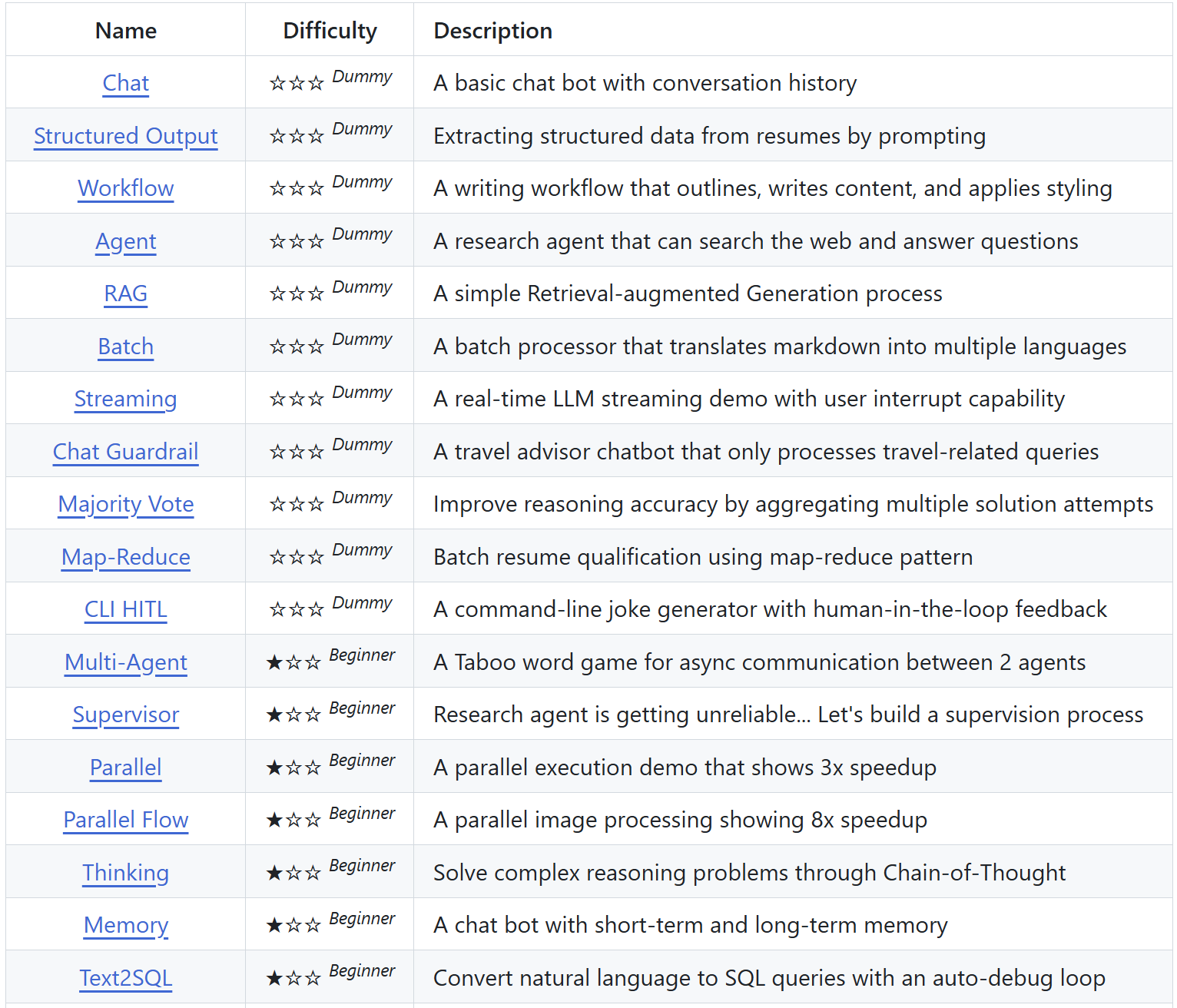
All built on the same 100-line foundation.
If you think these are just toys...
Let me show you something.
Just a more complex workflow. A bigger graph.
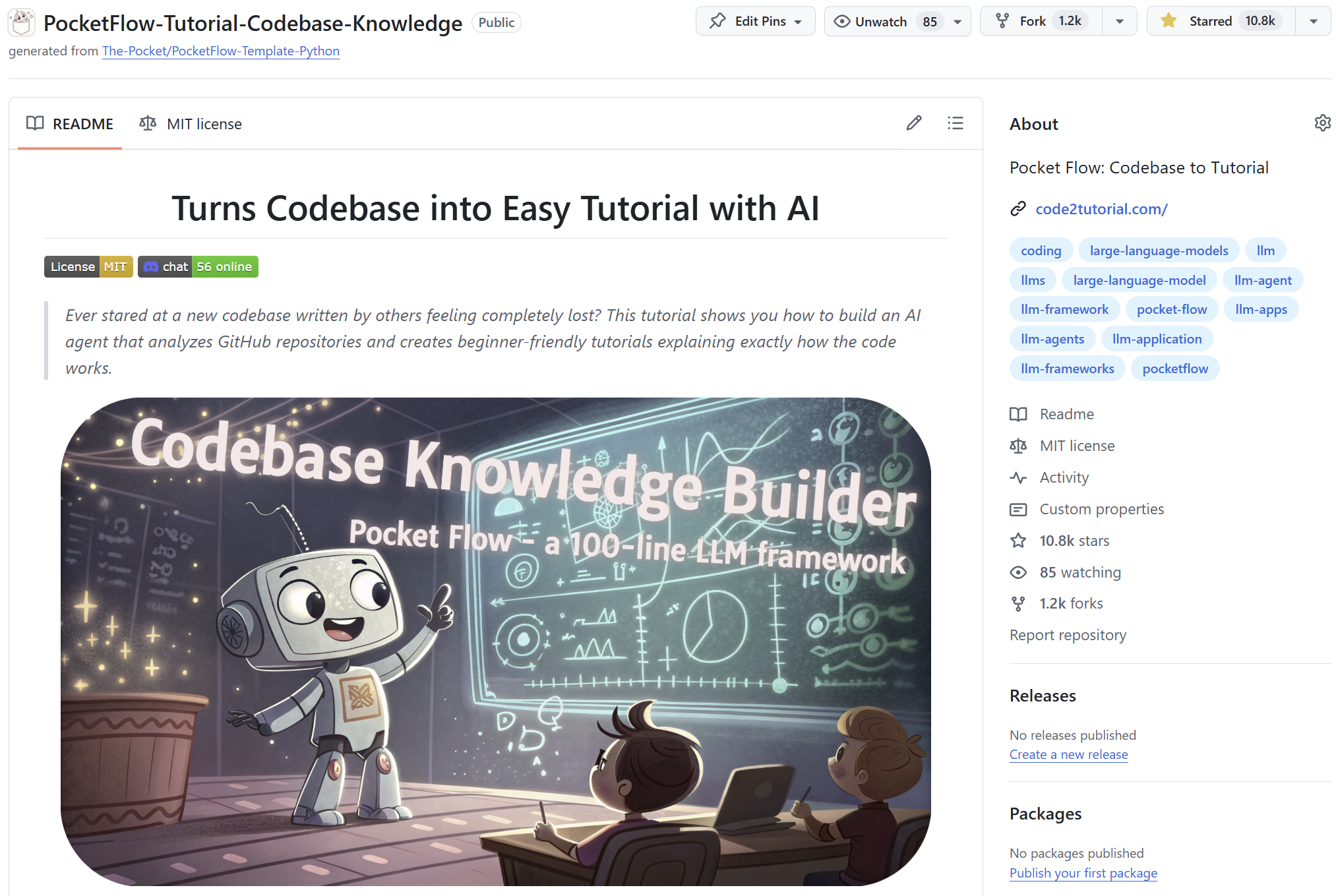
https://github.com/The-Pocket/PocketFlow-Tutorial-Codebase-Knowledge
